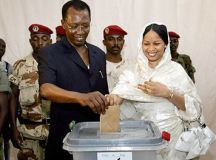Low voter turnout marks Chad’s presidential vote
May 3, 2006 (N’DJAMENA) — Low voter turnout Wednesday threatened to undermine the credibility of the third multiparty election in Chad, one of Africa’s newest oil producers.
 President Idriss Deby was set to win a third term after 16 years in power, but he was increasingly isolated. The main opposition parties boycotted the vote, Chadians largely ignored it and rebels threatened to disrupt the election.
President Idriss Deby was set to win a third term after 16 years in power, but he was increasingly isolated. The main opposition parties boycotted the vote, Chadians largely ignored it and rebels threatened to disrupt the election.
Three of Deby’s allies and a minor opposition leader provided a token challenge nearly three weeks after rebels, who include Deby’s relatives, made a failed bid to capture the capital. The insurgents launched the pre-dawn raid from bases in the volatile region where Chad meets Sudan’s Darfur.
“All Chadians have come out to make their choice, the choice of their hearts, the choice of their convictions,” Deby said after casting his vote. “This is enough proof that the people of Chad are mature, that they don’t need anybody to tell them to boycott elections.”
Power has never changed hands at the ballot box in Chad. Deby, who seized power in 1990, won votes in 1996 and 2001 that critics say were neither free nor fair. He introduced a semblance of peace in Chad, after the country endured three decades of civil war and an invasions by Libya.
Last year, he pushed for a national referendum to change the constitution to allow him to run for a third term. The amendment passed after an opposition boycott, but the move appears to have added to dislike of him among voters.
Deby’s rivals had said the country needed electoral reform before credible polls can be held. Deby countered that a delay would create a constitutional vacuum.
“We don’t want to vote!” a woman shouted at a vehicle carrying Associated Press reporters near a polling station, where only a trickle of voters had gathered. More people were chatting outside some polling centers than lining up to vote.
“We are not voting because conditions are not right. The opposition asked for the election to be postponed so a consensus can be reached (on electoral reforms), but the president refused,” a man who was with the woman said. “So this election, he will do what he wants.”
Both spoke on the condition of anonymity because they feared for their safety.
About 5.8 million people in this country of almost 10 million are registered to cast ballots at some 11,800 polling stations.
The electoral commission’s timetable says provisional results will be announced by May 14, but the outcome was likely to be clear before then. After provisional results are announced, candidates will have 10 days to make any challenges before the Constitutional Court, which will declare the final results.
The rebels had pledged to prevent the election from taking place. Their April 13 attack on the capital was repulsed, with 350 killed in the fighting.
Authorities stepped up security in some neighborhoods, with armed police in pickup trucks patrolling the streets.
Only a few international observers were present.
Darfur _ where Sudan’s government is accused of backing Arab tribal militias known as Janjaweed that murder and rape civilians and lay waste to villages _ has been a staging ground for Chadian rebels. Sudan accuses Chad of supporting the Darfur rebels.
Eastern Chad is home to some 200,000 refugees from Darfur and violence from the conflict in Sudan has been spilling over the border.
Chad began pumping petrol from an oil field in the country’s south in 2003. But oil has not meant instant riches, and has been another source of tension in this impoverished country.
Deby defended his 16-year tenure during his campaign, saying Chad had made economic and social strides and he had allowed democracy to take root in the country. He also railed against Sudan, something he has done since rebels who have been fighting in eastern Chad attacked N’djamena, about 620 (1,000 kilometers) from their bases, on April 13.
Deby, who himself came to power with Sudan’s help, says the rebels are mercenaries hired by Sudan to destabilize the central Africa region, a charge Sudan denies.
But some of the leading Chadian insurgents are members of Deby’s family.
Some 70,000 people who have fled their homes to escape violence in eastern Chad or live there now face growing food shortages amid rising tensions and reported preparations for attacks, the U.N. food aid agency said Wednesday.
The closure of the border between Chad and Sudan also has hit efforts by the World Food Program to feed half a million people in West Darfur. Much of the food arrives from Libya through Chad, the agency said.
(ST/AP)
